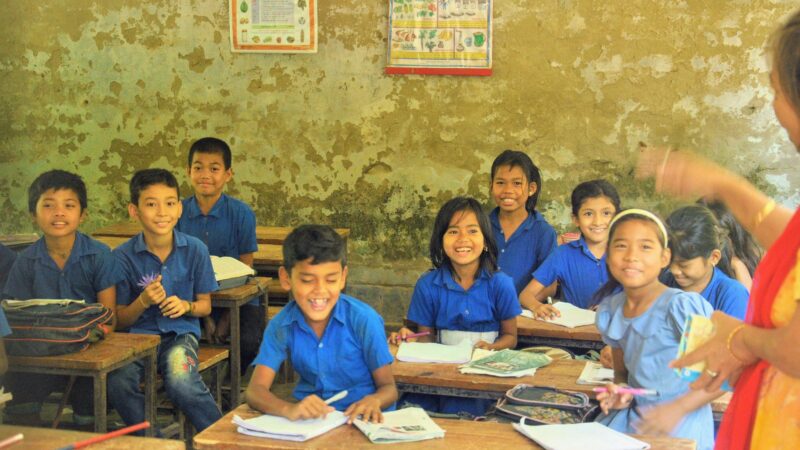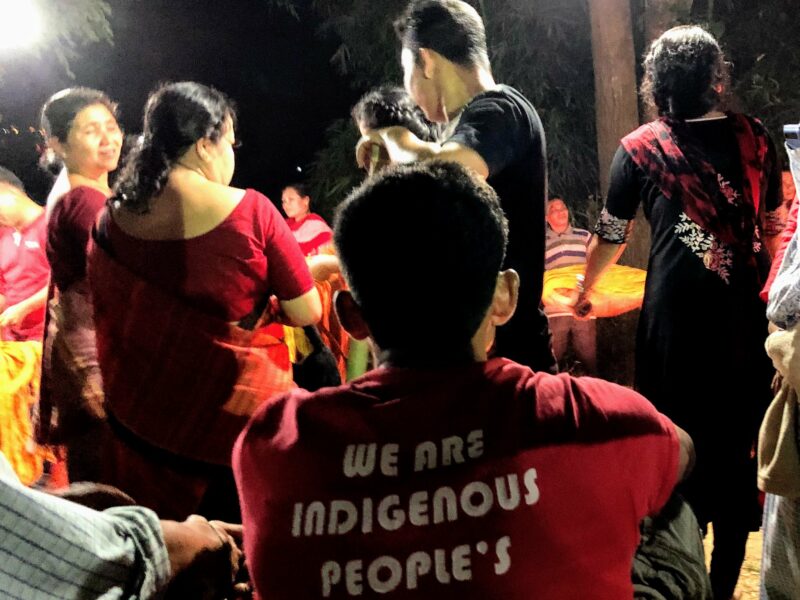“Why do you want to establish that I have another identity”?
Originally published on Global Voices

Chakma children in Rangamati, Bangladesh. Image via Flickr by Mohammad Tauheed. CC BY-NC 2.0.
Bangladesh is home to more than 50 ethnic and indigenous tribes (Adivasis) speaking at least 35 different languages. On July 19, 2022, the Ministry of Information and Broadcasting issued a directive to 35 TV channels asking them not to use the word “Adivasi” (Indigenous people), referring to a provision of the 15th amendment of the constitution.
The ministry issued the directive citing a letter issued by the Directorate General of Forces Intelligence (DGFI) and urged all potential speakers — academics, experts, journalists and other civil society members who may participate in talk shows and other programs on television channels marking the International Day of the World's Indigenous Peoples on August 9 to promote the constitutional obligation not to use the word Adivasi when referring to ethnic tribes.
What’s in a name?
The 15th amendment of the Bangladesh Constitution promulgated on June 30, 2011, included a new section highlighting the need to protect the culture and heritage of the Adivasis (indigenous people). However, it referred to the indigenous tribes as “upa-jati” (tribal), “khudro nrigoshthi’”(small ethnic group), “khudro-shomprodai” (small community), and “khudro-jatishotta” (small nation/people). In an interview, the then State Minister for Cultural Affairs Promod Mankin mentioned that the government is reluctant to recognise the Adivasi identity as it questions the ethnicity of the country's native Bengalis.
As per the 2022 Census, Bangladesh has a population of 165 million people, out of which only 1 percent belong to ethnic minority groups and an overwhelming majority of over 98 percent are Bengalis. Some Bangladeshis also endorse the government’s position highlighting that many of these tribes are not native people and are settlers; however, they want them to also have equal freedom and rights as Bengalis.
The doctrine comes from monolithic nationalism and an identity defined by the policies and the position of the state. However, for some time now, some groups of ethnic minorities in the country are demanding recognition as Adivasis.
Condemnation of the directive
When the July 19 directive became viral on social media, a renewed debate on this issue ensued. Many rights activists, educators, researchers and members of the ethnic communities protested the directive.
Deepayan Khisa, the Information and Publicity Secretary of Adivasi Forum, told the media that the notification is a gross violation of the freedom of expression of the ethnic identity and thereby interferes with the freedom of the media.
International Chittagong Hill Tracts (CHT) Commission has expressed shock and called this directive “very undemocratic and derogatory to the indigenous peoples.”
Journalist AHM Faruk wrote on Facebook:
বাংলাদেশে আদিবাসী যদি না থাকে, তবে সরকারকে আগে আদিবাসী বিষয়ক সংসদীয় ককাস, বাংলাদেশ আদিবাসী ফোরাম ইত্যাদি নামক ব্যবসায়ী প্রতিষ্ঠান ও সংগঠনগুলো নিষিদ্ধ করতে হবে এবং এমপি মন্ত্রীদের আদিবাসী শব্দ প্রয়োগ বন্ধ করতে হবে। তখন এই প্রজ্ঞাপন সার্থক হবে।
If there are no Adivasis in Bangladesh, then the government should first ban the business organizations and organizations like the Parliamentary Caucus on Indigenous Affairs, Bangladesh Adivasi Forum etc. and the government officials including the members of parliament should stop using the word “Adivasi”. Then this directive will make sense.
In fact, in December 2019, the NGO affairs bureau of the government sent a letter to six NGOs that have Adivasi in their names asking them to change their names.

At the yearly Chakma festival of Kotheen Chibor Daan. Image via Flickr by Mohammad Tauheed. CC BY-NC 2.0.
S Bikash Chakma mentioned in a video on Facebook that he is saddened by the directive by the government:
আমি একজন আদিবাসী এটা নিয়ে আমার কোন সন্দেহ নেই। কিন্তু আপনারা জোর করে আমাকে অন্য পরিচয়ে পরিচিত করতে চাইছেন কেন?
I am an Adivasi – no doubt about it. But why do you want to establish by force that I belong to another identity?
Writer Ahmed Aman highlights from the 15th amendment of the constitution:
“আদিবাসী” শব্দের পরিবর্তে সেখানে উপজাতি, ক্ষুদ্র জাতিসত্তা এবং নৃ-গোষ্ঠী শব্দ তিনটি যোগ করা হয়েছে। কিন্তু সংবিধানের কোথাও এটা উল্লেখ করা হয়েছে কি যে, এখন থেকে আর “আদিবাসী” শব্দ ব্যবহার করা যাবে না, করলে সেটা সংবিধান অবমাননা কিংবা রাষ্ট্রদ্রোহিতা বলে গণ্য করা হবে? বিষয়টি পরিস্কার না করা পর্যন্ত টকশো কিংবা প্রিন্ট ও ইলেকট্রনিক মিডিয়ায় “আদিবাসী” শব্দ ব্যবহার না করার নির্দেশ দেওয়াটা কতটা যুক্তিযুক্ত?
Replacing the word “Adivasi”, three words have been added [in the constitution]: tribe, minority ethnic clans and ethnic group. But is it mentioned anywhere in the constitution that the word Adivasi can no longer be used? If mentioned, will it be considered contempt of the constitution or treason? How reasonable is it to order not to use the word Adivasi (indigenous) in talk shows or in print and electronic media until the issue is resolved?
Journalist Arafatul Islam writes in Deutsche Welle Bengali:
আদিবাসী, উপজাতি বা ক্ষুদ্র নৃগোষ্ঠী – যেটাই বলা হোক না কেন, এ সব গোষ্ঠীকে বাংলাদেশ রাষ্ট্র একটি অধিকার সুনির্দিষ্টভাবেই দিচ্ছে৷ এঁরা সরকারি বিশ্ববিদ্যালয়ে এবং সরকারি চাকুরির ক্ষেত্রে কোটা সুবিধা পান৷ এই সুবিধা তাঁদের উন্নতির পথে সহায়তা করছে৷ তবে তা পর্যাপ্ত নয়৷
Indigenous people, tribes or ethnic minority groups – in whatever name they are called, the Bangladesh state gives specific rights to all these groups. They get privileged quota benefits to get enrolled in government universities and government jobs. These facilities are helping them progress, but it is not enough.
Samudoy Chakma from Rangamati wrote on Facebook:
We have been fighting for our identity as “Indigenous” from the beginning. They call us “upojati” (tribes) which includes nothing but an insult to us.[..]
We are an Indigenous community in Bangladesh. We have our languages, we have our own culture, and we have our traditions.
August 9 is the “International Indigenous Day”. I'm Marma from Bangladesh. I belong to the Indigenous community.
Post a Comment